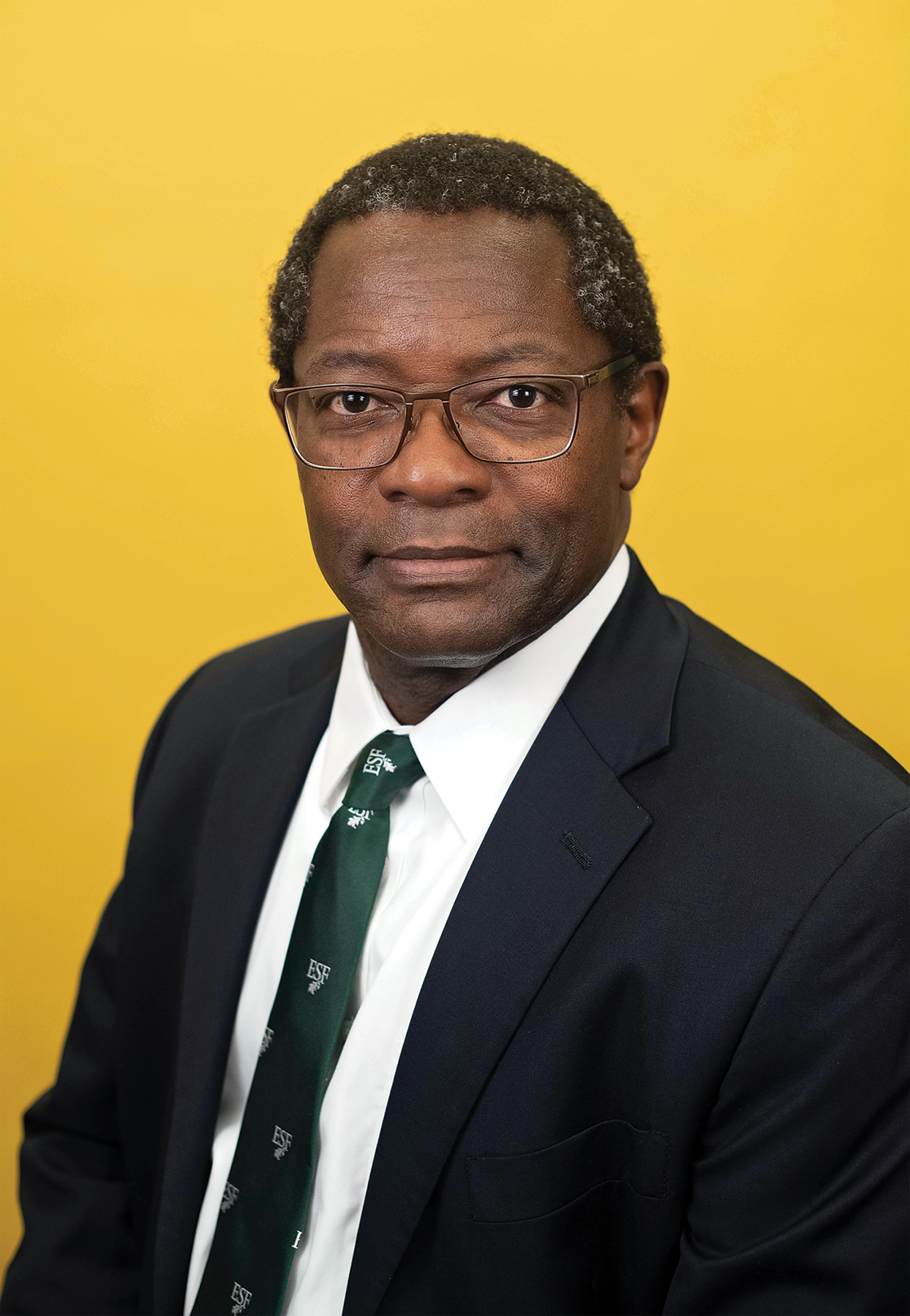
Executive Vice President and Provost Samuel Mukasa
When asked what drew him to pursue—and ultimately secure—the provost role at ESF, Dr. Samuel Mukasa posed a question in response: “Who wouldn’t want to be part of the amazing activities going on here?”
He’s right. ESF’s faculty, students, researchers, and alumni are working on the frontlines to understand and solve some of the most compelling topics dominating global conversations: existential climate crisis, environmental sustainability, ecosystem preservation, natural forestry and water resources, high-tech materials, renewable energy, and urban infrastructure.
“ESF is one of those places that has a wonderful sense of purpose and direction. I want to be at the table as we innovate solutions to the environmental threats that humanity faces today, and ESF is the place to be,” he said. “We’re an institution that hit the ground running on these issues well before most others ever did.”
If the College’s past is any indication of its future, there are no plans to slow down. Mukasa is hopeful and passionate and excited. He reflected on the College’s sense of purpose, commitment to inclusive excellence and student success, and drive for innovation. In his role at ESF, he said he sees himself as a facilitator and cheerleader; someone who motivates and empowers students, faculty and staff. He’s also looking forward to playing key role in the College’s tradition of alumni engagement and identifying ways for our alumni to share their experiences and wisdom — acquired over many years of working in the private sector, government, education or non-profits – with our current students.
“My primary responsibility is to support the ESF community through the challenges we are going to face and to position us for success, taking advantage of all the opportunities that come our way or that we create ourselves.”
The World in His Hands
Mukasa was a third-grader when his revered uncle put a small gift in his hand and a big question in his mind.
Decades later, he described the transformational moment: “As my uncle handed me (a miniature globe), he said, ‘Have you ever noticed that Africa and South America can fit back together like pieces of a jigsaw puzzle?’”
That encounter, which lasted about 30 seconds, launched him on a career to understand plate tectonics. He pursued a Ph.D. measuring time using radioactivity, specifically focusing on the radioactive atoms of uranium decaying to lead. He has measured rates of plate tectonic movements, and the coming together and breakup of continents.
As a teenager growing up in Uganda, Mukasa befriended a boy from New Hampshire. They swam and cycled together, and the relationship led Mukasa to pursue his education at the University of New Hampshire. He did graduate studies at The Ohio State University and the University of California at Santa Barbara; took on leadership positions at the universities of Minnesota, Michigan and New Hampshire; and became a highly regarded researcher in geochemistry, geochronology and petrology.
Now at ESF, he pledges commitment to his most prized core values: student success, academic excellence, social justice, and fairness.
“Similar to what I have done at other institutions, I will pursue these at ESF through engagement and equitable service to all students, faculty and staff, and expansion of opportunities to the entire community all around us,” he said.
Making Investments in the Future
From Mukasa’s perspective, sustaining these values demands vigilance, anticipation of change, and the ability to be nimble, which an institution like ESF is well equipped to do.
“It requires investing in the recruitment, hiring, empowering, mentoring, and retaining of top-flight faculty with brilliant pedagogical and research ideas,” he said. “However, the learning process also benefits immensely from a climate that respects and embraces diversity, equity and inclusion, and highly values community-building activities through student clubs and external engagement by all of us.”
Mukasa stopped short of writing a prescription for ESF’s future, pointing out that the College has a long history of exploring environmental issues that only recently have been embraced by other institutions.
Mukasa said he’s not interested in bringing pre-packaged ideas to the table; ESF is unique and the landscape continues to shift. Rather, his priorities will be shaped by visiting every academic unit on campus to develop a deeper understanding of the opportunities at the College and how we can improve upon and expand them. In his experience, conversations across campus are necessary to uncovering issues, identifying solutions, and staying connected. It’s also important to him that ESF remains committed to the merits of diversity, equity, and inclusion, and he believes the College has the responsibility to create opportunity for everyone, mindful of the fact that access and affordability are big challenges in some communities.
Above all, Mukasa sees his role as provost as helping ESF maintain its lead in student success and position the College to continue driving solutions for current and future challenges locally, nationally, and globally.
And who wouldn’t want to be part of that?


